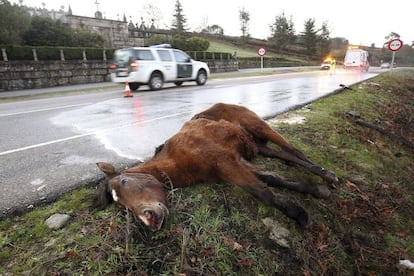If you hit a wild boar, it’s your fault
New draft road safety law is up for debate in Senate as experts warn of “dramatic” consequences


"One day, a young man will be riding his motorcycle on a road that cuts through a game preserve. He will have the misfortune of colliding with a wild boar crossing the road at that precise instant, and he will have the further misfortune of being bound to a wheelchair as a result. And then we will read him the new road safety law, and tell him that our politicians have decided he is responsible for the accident and will not be receiving any compensation, but not to worry because at least he will not have to pay for the dead boar."
This is how lawyer José Pérez Tirado, an expert in road safety and spokesman for the traffic accident victims' associations, describes what could happen if the draft Road Safety Law now up for debate in the Senate is passed without any changes.
Until now, drivers were only considered responsible for an accident involving game if they had violated driving regulations. If, instead, it was a result of a hunting expedition that pushed the animals onto the road, or poor fencing maintenance, the blame fell on the owner of the grounds. The proprietor of the public road could also be held accountable if the accident occurred because of poor road conditions or a lack of proper signaling.
“A runaway horse killed my husband”
Elena Plaza's husband died when his car collided with a runaway horse on the M-100 highway in Alcobendas (Madrid). The accident occurred on December 7, 2001, over 12 years ago. Since then, Elena has been caught up "in legal procedures that never end."
Neither she nor her daughters have received the compensation they are entitled to -- 107,096.28 euros for the mother and 44,623.45 euros for each of her two daughters, who were nine and 11 when they lost their father.
On that December 7, a mare and a colt escaped from a fenced enclosure and caused two accidents. The mare was hit by a driver who subsequently skidded off the road. The colt caused the death of Elena's husband.
According to the police report, a witness saw "a very nervous-looking man" talking on the phone and saying: "They must have gotten out through the break in the fence."
Another witness heard the same man asking someone on the other end of the phone to "urgently go and file a police report about thieves breaking into the estate."
It was Julián Solera, the owner of the land, whose wife indeed filed a report about alleged horse thieves breaking in at 11:32pm. But the accident had taken place much earlier, at 8:20pm.
The criminal trial, held five years after the accident, acquitted the estate owners and the owners of the animals, who had left them there for training. According to the ruling, it was impossible to sentence the person allegedly responsible for letting them get away, a groom who died before the trial. Nobody was able to produce a copy of the contract showing that this person had been hired at the estate.
The horse owners were still ordered to pay compensation, but continuous appeals keep delaying the payment laid out in the court ruling. Elena barely has any strength left to fight. "It's a battle against the elements," she says. "What can I appeal against, if the police report was crystal clear? Justice will not be done -- my husband is dead because a horse ran off and killed him."
But the new bill states that in any accident in which a driver hits a game animal, "the driver of the vehicle will be responsible for any damage to people or goods," although this does not extend to paying for the dead animals.
Exceptions are made if the collision occurs as "a direct consequence of a collective hunt of large game [anything larger than a fox]", as long as it happens at the time of the hunt or in the following 24 hours. If the hunters were out shooting rabbit or partridge, the driver will be to blame. Public authorities can still be held accountable if they have failed to repair damaged fences or did not put up signs, but the road conditions are left out.
"There is significant pressure being exerted by owners of game preserves" to get such legislation passed, says Juan Carlos Corcuera, a Socialist deputy who is the spokesman for the congressional road safety committee. The reasons behind this push, says Corcuera, are quite clear: "There are lots of preserves, and frequent accidents on the roads that cut through them."
Spain has 24,677 private game preserves, according to the latest figures released by the Agriculture, Food and Environment Ministry. But these numbers do not include the regions of Extremadura, Galicia or Aragón, which means that the real number is actually much higher.
In 2012, the DGT traffic authority reported 484 accidents involving animals that were hit by a vehicle, resulting in four human deaths, 51 serious injuries and 586 light injuries. These figures do not specify the animal species that were hit, nor do they include accidents with no injuries. But sources at the Natural Heritage and Biodiversity State Council estimate there are anywhere between 15,000 and 20,000 such accidents a year.
The civil liability resulting from road accidents caused by wild animals constitutes "a real sword of Damocles" for hunting clubs and preserve owners, admit sources at the Royal Spanish Hunting Federation, which also confirms the existence of a hunters' lobby. In fact, they like to boast that the Popular Party's bill is the result of "the efforts and pressure effected by the hunting sector."
The Socialist deputy Corcuera underscores how detrimental the new law will be to drivers who are injured or killed through no fault of their own, as "they will not be covered by civil responsibility insurance," since they are considered guilty; they will also not be covered by the preserve's insurance or by the government, since "it will be practically impossible to assign the blame to them."
Should the victim suffer serious injuries, or even death, "there could be dramatic situations for the victims or their relatives, since they would have no right to any kind of compensation."
"If the new bill is passed, preserve owners are going to benefit from many advantages, since they will be able to use fewer safety measures to prevent animals from crossing the road, and their civil liability insurance will be much cheaper," says Tirado, who expresses surprise at "the power of the hunters' lobby" against drivers who are following road regulations.
Tu suscripción se está usando en otro dispositivo
¿Quieres añadir otro usuario a tu suscripción?
Si continúas leyendo en este dispositivo, no se podrá leer en el otro.
FlechaTu suscripción se está usando en otro dispositivo y solo puedes acceder a EL PAÍS desde un dispositivo a la vez.
Si quieres compartir tu cuenta, cambia tu suscripción a la modalidad Premium, así podrás añadir otro usuario. Cada uno accederá con su propia cuenta de email, lo que os permitirá personalizar vuestra experiencia en EL PAÍS.
¿Tienes una suscripción de empresa? Accede aquí para contratar más cuentas.
En el caso de no saber quién está usando tu cuenta, te recomendamos cambiar tu contraseña aquí.
Si decides continuar compartiendo tu cuenta, este mensaje se mostrará en tu dispositivo y en el de la otra persona que está usando tu cuenta de forma indefinida, afectando a tu experiencia de lectura. Puedes consultar aquí los términos y condiciones de la suscripción digital.








































